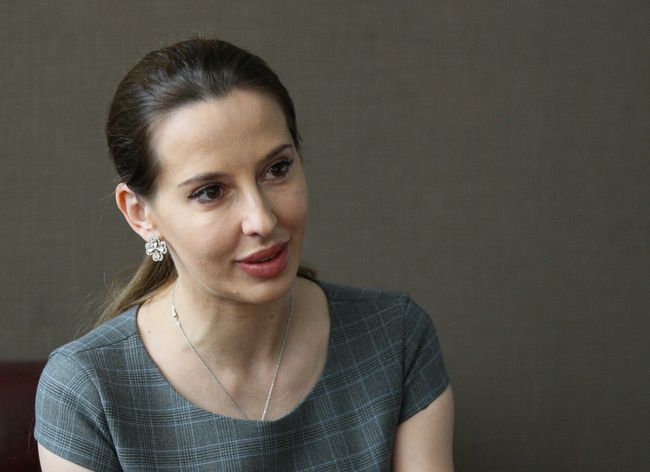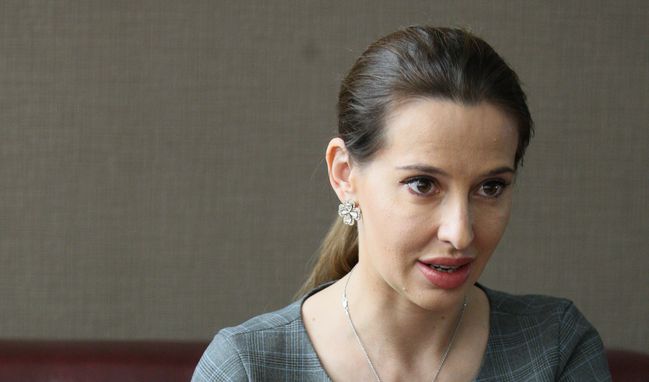The Day met electronic governance expert Jaanika Merilo immediately after the e-declaration system scandal (you can see her opinion about officials’ “outright bluff” in The Day, No. 23, April 4). Taking into account her broad international experience (Ms. Merilo, a citizen of Estonia, has achieved great successes not only in her native country, but also in a number of European companies) and considerable contribution to the public sector of Ukraine, we could not help asking the expert what she thinks of how fast this country is moving towards an electronic society what are the main obstacles on this road. (Incidentally, more than one Russian-speaking Ukrainian will envy her command of the Ukrainian language.)
“EVERYTHING HAS BEEN DONE CHAOTICALLY UP TO NOW”
You were an advisor to Aivaras Abromavicius, Minister of Economic Development and Trade, and now you are an advisor to the minister of infrastructure and to the mayor of Lviv, and the acting deputy mayor of Dnipro. Do you think on the basis of your experience of working in Ukraine that there is a real understanding of the necessity to systemically introduce e-governance? What factors are at play here?
“No, there isn’t because there is no strategy. As long as it is absent, there are no directions to move in or understanding of who must do what and when. In other words, we still have no strategy of electronic society – it is not only about governance, but also about such things as whether there is the internet, whether it is accessible, whether people can use it, etc. There is a digital agenda in Europe – various directions that determine what is to be built and what conditions are to be created. The point is that there is an accessible internet everywhere, the legislation, and technologies. We don’t have such a plan of actions at all. And it is a very acute problem, for everything has been done chaotically up to now. Someone did something here and someone in another place, somebody succeeded and somebody failed. But this should be on a governmental level. Today [the interview was recorded on April 3. – Ed.] our electronic ticket taskforce holds a session, and I intend to stress the necessity for an integrated governmental strategy. This means that there should be no different wishes, approaches, and techniques that never cross one another and never contribute to cooperation. There should be one strategy and standard: for example, the e-ticket that works in Kharkiv should also work in Kyiv, Lviv, etc. In other words, there is so far no strategy, no understanding of where the state wants and must move to.”

Who should initiate mapping out this strategy? Will public pressure help here?
“Pressure always helps. I even say to ours: ‘Troll, and this will speed up things.’ I know that the State Agency for Electronic Governance, which is directly subordinated to the prime minister, is working on this strategy, but it hasn’t been published, so there is nothing to discuss do far. It is like reforms – reforms are under discussion all the time but almost nothing has been done. In theory, the strategy can be initiated on the legislative level by the parliamentary committee for information technologies with Oleksandr Danchenko at the head, the Reform Office, or the president. I know that High Tech Office is also preparing a digital agenda.”
“THE MOST IMPORTANT REFORM IS THAT OF JUSTICE”
There is a hackneyed phrase: “reforms are faltering.” Why do you think they are faltering? Is the problem in the “customer” or the “supplier”?
“Partly, at the level of understanding and communication and at the level of the customer and the supplier. Reforms can’t be carried out in two years. It has taken Estonia 25 years to carry out reforms. This means that improvement is a long process. It takes so much time to pass and fulfill a law, and to put it across to the masses. In other words, we are expecting more than can be done. We are asking why we aren’t living better than Poland or Slovakia, without taking into account that it took them decades to bring about transformations. Secondly, it is clear that something can be done faster. But the problem is that even if the government wants to work actively, something still depends on legislation. But we will fail to change the law the way it was done in Estonia, where MPs did so within three months, for they were aware of this necessity. In Ukraine, somebody wants to ‘rock the boat,’ ‘to turn it over,’ or to ‘pull it to himself,’ while somebody else blocks the rostrum for various reasons. It takes Ukraine about a year, on the average, to pass a law. In other words, how can you possibly work if the law will be passed in a year at best or, at worst, in an indefinite future? The only good example was the electronic ticket bill which we railroaded through parliament in a year and a few months. We succeeded in this case because we managed to rally as many people as possible. But still it was too long a time because these processes are supposed to be automatic and understandable.
“Work also slows down because perhaps not all the ministries want to carry out reforms fast enough. There is also bureaucracy and very many things the non-public sector finds hard to understand. This means that what we have done in the private sector is now being done at the governmental level three or four times more slowly. For example, a certain decision is to be made in a city. It will take city executive committee 20 days to discuss it, then comes the turn of the committees, and, finally, the vote. It’s so slow indeed. Maybe, it’s part of the process – no matter if it is called democracy or inefficiency (smiles).

“In brief, there are no ideal conditions. Firstly, a bill can fall through because, no matter how good it is, it is a ‘cow,’ a ‘drone,’ or ‘Novinsky.’ Secondly, there are such things as unwillingness to move fast and bureaucratic obstruction. But I think very much has been done, as far as e-governance is concerned. In other spheres, it is unclear why things go slower than we expected. In my opinion, the most important reform is that of justice. If courts don’t work, everything else won’t work. For, sorry, even if the police detain a wrongdoer but a public prosecutor or a judge frees him, what are we talking about? We are always in this situation. Until justice begins to function, the rest will be on a different level.”
You forecast in 2015 that Ukraine might expect to fully switch to e-governance in 15 years’ time. Have you changed your mind now?
“No. On the contrary, I don’t think everything is so bad. Again, as long as there is no strategy, we cannot make forecasts. If there were a strategy, a plan of actions, and understanding, this could surely be done in 15 years. Various rating lists show that we have made certain progress in the past two years. For example, we ranked 87th in e-governance two years ago, but now we are 62nd i.e. we have jumped 25 places up! Estonia is 13th and Georgia 61st there. We are moving very fast in this sphere, but it’s still a very long way to go before people begin to be constantly aware of this. Because you may need some certificate, but there are no electronic records, and you’ll have to scan tons of papers… It will take a certain time to streamline this.”
“IT IS VERY EASY IF EVERYTHING DEPENDS ON YOU”
A lot of projects are being implemented in Dnipro, where you’ve been working for eight months, such as electronic ticket, Electronic Health system, Dnipro Resident’s Card, Navizor system. What is the progress of these innovations?
“Political will is the No. 1 thing. We’ll achieve nothing without it. If the ‘upper crust’ doesn’t want, the ‘grassroots’ will not, unfortunately, do much. This is why ministries or cities must cooperate in the field of electronic services. You can’t possibly launch e-services if the city says it doesn’t need any. The bodies must interact. We, in Dnipro, have an absolute political desire and will. To begin with, Mayor Filatov received us and gave us carte blanche – we have no restrictions in work. Nothing has ever been slowed down. Of course, bureaucracy works slower, but there’s full support. Never in the past eight months have there been such questions as ‘What’s that for?’, ‘Why this?’, ‘Do we really need this?’ It is very easy if everything depends on you. I mean if you haven’t done something, it is a question to yourself.

“It always irritates me that a democratic state works much more slowly. For I can also see from aside: if it were a private enterprise, it would have done everything long ago. But I can’t do it quicker because decisions must go through all the levels of bureaucracy – what I call ‘all the circles of hell.’ There are some processes which we can’t speed up, but I think successes began because there was political will.
“Incidentally, a very successful example is the Electronic Health program. We are launching four systems in it to compare which is better and more suitable. As part of the e-health program, 40 percent of Dnipro people have made an appointment with a doctor via the internet. I’ve always been saying that e-governance will catch on if decisions are of benefit to people. Take, for example, an online non-conviction certificate. As this service is not needed on a mass scale, it will take a long time to get it. But now that you can use the outpatient hospital electronic waiting list, old women will be often asking: ‘How can I sign up?’ It seems to me that Dnipro clearly shows that we have made the decisions that are of benefit to people.”
“LVIV, DNIPRO, AND VINNYTSIA (IRRESPECTIVE OF THE ORDER OF NAMING) ARE THE FIRST THREE”
Past August, before moving to Dnipro, you said you would consider the work done when 90 percent of the city residents began to make use of e-services. When do you think this will occur?
“I remember saying something about 15 years. The mission remains unaccomplished, so, logically, I need to work for another 13 years (smiles). The forecasts are almost the same, if not even lesser. I think it will be ideal in 15 years’ time – there will be no contacts at all with the state, like in today’s Estonia – I must have last communicated with the state five years ago because I need nothing from them and they need nothing from me, for everything is electronic. In general, there are not many reference notes because governmental bodies supply one another with information. Again, if you need a non-conviction certificate, turn to the ministry of the interior. If another ministry or somebody else needs one, why are you asking me? Contact one another. Ideally, there will be an electronic world like this in 15 years’ time.
“As for the fact that 90 percent of people will be making use of some decisions, this process will be faster in Dnipro. For this will only reach other cities, which do not want to and will not launch e-governance, when the local self-government makes a decision or somebody ‘from above’ forces it to do so. But still, to force is one thing and to try to help and popularize is another. For example, even if we launch an electronic certificate, but the city does not help us, keeps silent about it, and passively opposes us, it will not be on a mass scale. In other words, the state must also show interest. I think most of the Dnipro residents will be using e-services sooner than in 15 years’ time. So far, it is dozens of thousands of people, whereas our population is almost a million – for this reason, it is not yet clearly noticeable.
“It takes time to inform about all decisions. Besides, there’s so much inertness here, and information is slow to reach people. OK, we have launched a new service. Maybe, this was reported in a news bulletin or not reported at all because many do not understand what we are saying at all. Therefore, to make information reach the masses and people to know and use electronic services, there must be communication. But, again, such online services as making appointments with doctors, e-prescriptions, e-tickets, etc., will be used more often because this is what people need daily or every other day. I think we will solve this problem through mass-scale services, when ‘the grapevine’ works. It’s a wonder that ‘the grapevine’ had worked so fast in the case of outpatient hospitals – 40 percent of people are using this service. This means that 40 percent of the approximately 25,000 patients, who sign up monthly, do so via the internet. Some are saying that old women will not be using this. Pensioners account for 40 percent of the registrars who work on this electronic issue. Among them are doctors, nurses, et al. They are teaching other outpatient hospitals and centers today. So if people need and understand something, they will be using this service.”
On the whole, the authorities of what cities show more of this initiative and understanding? What is the picture?
“The picture is variegated. Some small towns are very progressive, but it is bit easier to implement this in small towns in any case. There are also big cities. I think Lviv, Dnipro, and Vinnytsia (irrespective of the order of naming) are the first three. Kyiv is lagging behind very much, although it has all the possibilities. You can even see this in various rating lists of electronic services or certain decisions, where it is not in the Top 5. Given its potential, Kyiv could be a powerful leader, for it has more resources, money, people, etc. Among the other progressive ones are such not so big cities as Lutsk, Mariupol, and Kamianets-Podilsky. It is very gratifying that small towns also begin, quite on their own, to launch e-governance and be aware of its importance. Again, this depends on political will. Where there’s a will there’s a way.”







